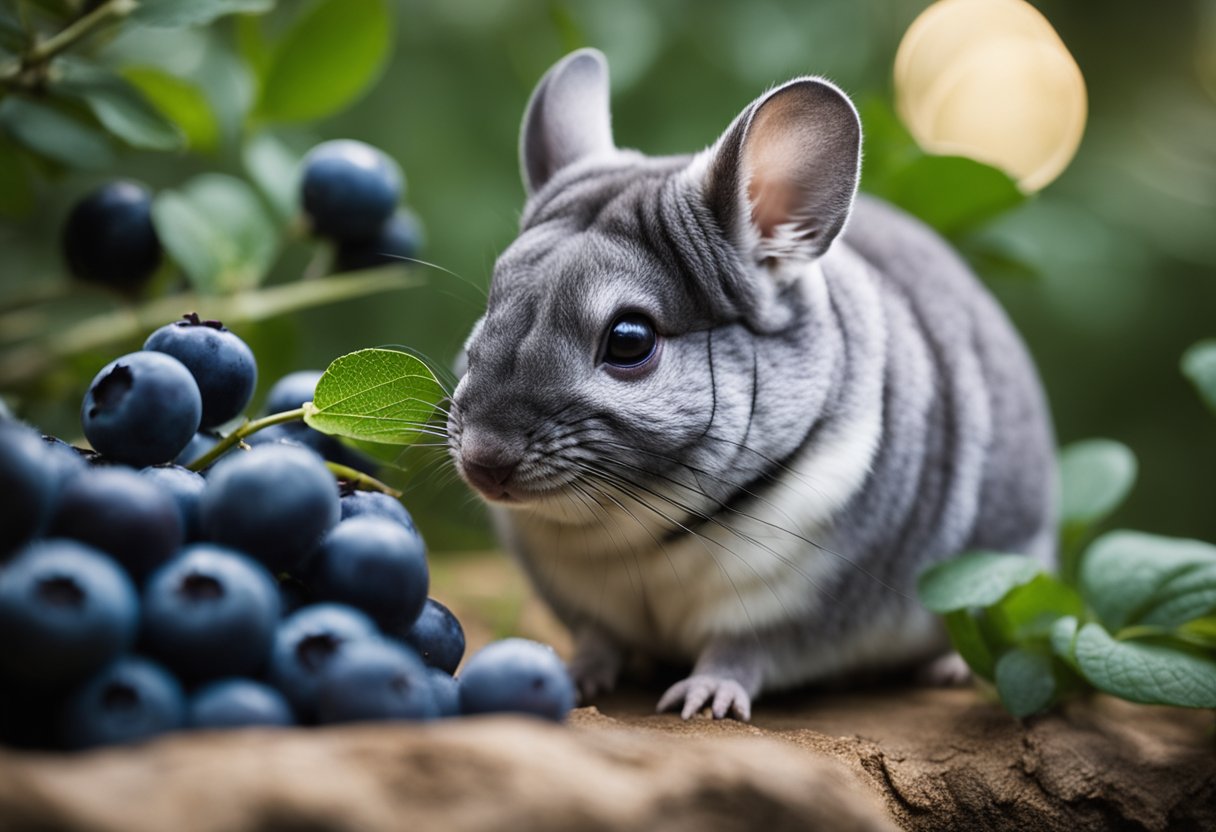Chinchillas are adorable pets, but their unique digestive systems require careful attention to diet. You might wonder if it’s safe to offer them treats like blueberries. While chinchillas can eat blueberries, it is important to limit them to occasional treats due to their high sugar content.

Choosing the right snacks for your chinchilla can help maintain their health and happiness. Understanding which fruits are safe for them can enhance their diet without causing harm. This article will explore how to incorporate blueberries into your chinchilla’s diet safely, along with other essential dietary tips.
Key Takeaways
- Chinchillas can have blueberries as an occasional treat.
- Moderation is key to preventing digestive issues.
- A balanced diet is crucial for your chinchilla’s well-being.
Chinchilla Dietary Basics

To keep your chinchilla healthy, it’s important to understand their nutritional needs. A proper diet ensures they thrive and avoid digestive issues. Here are key aspects of chinchilla nutrition.
Understanding Chinchilla Nutrition
Chinchillas are herbivores, meaning their diet should mainly consist of high-fiber foods. In the wild, they eat grass, hay, and herbs, which support their unique digestive system.
Fiber is crucial for preventing gastrointestinal problems. You should provide unlimited access to hay, such as timothy or orchard grass. These options help maintain their teeth and overall health.
Chinchillas also need a small amount of pellets that are specifically made for them. Look for high-quality pellets with low protein and no added sugar. Avoid fruits and vegetables, which can cause digestive upset.
The Importance of a Balanced Diet
A balanced diet helps sustain your chinchilla’s health and longevity. Ensure that the majority of their diet comprises hay. This high-fiber food allows for proper digestion and helps prevent obesity.
Introduce treats like small pieces of hay-based snacks occasionally. You can offer small amounts of safe fruits like blueberries but only as an infrequent treat. Too much sugar or moisture can upset their digestive system.
Always provide fresh water and monitor their eating habits. Changes in appetite can indicate health issues. Proper nutrition is the foundation for a healthy and happy chinchilla.
Incorporating Blueberries into a Chinchilla’s Diet

Feeding your chinchilla blueberries can be a beneficial supplement to their diet, but it requires careful consideration. You should be aware of both the health benefits and potential risks. Following proper feeding guidelines can help ensure your chinchilla enjoys these treats safely.
Health Benefits of Blueberries for Chinchillas
Blueberries are rich in vitamins and antioxidants, which can support your chinchilla’s health. They provide essential nutrients that may contribute to better overall wellbeing.
Some of the key benefits include:
- Vitamin C: Important for the immune system.
- Antioxidants: Help combat free radicals in the body.
- Minerals: Such as potassium, which supports heart and muscle functions.
These nutrients can help your chinchilla maintain a healthy body. However, always remember to offer blueberries in moderation to avoid digestive issues.
Potential Risks and Considerations
Although blueberries have health benefits, there are risks to keep in mind. Their high sugar and water content can lead to digestive problems in chinchillas.
Some potential issues include:
- Diarrhea: Overfeeding can upset their sensitive stomachs.
- Obesity: Regularly feeding too many treats may contribute to weight gain.
- Sugar Sensitivity: Chinchillas don’t need high sugar levels in their diet.
It’s important to monitor your chinchilla for any adverse reactions when introducing blueberries. If you notice any symptoms like loose stools, reduce the amount offered.
Feeding Guidelines and Frequency
When giving your chinchilla blueberries, moderation is key. It is best to adhere to specific feeding guidelines to ensure their health remains a priority.
A good rule of thumb is:
- Limit to 1-2 blueberries at a time.
- Feed 2-3 times a week to prevent overloading on sugar.
Always wash the blueberries before serving to remove any pesticides. You can offer them as an occasional treat rather than a regular part of their diet. Most of your chinchilla’s food should be hay and pellets.
Resources
For more information on incorporating treats like blueberries into your chinchilla’s diet, consider these helpful links:
- Check out Can Chinchillas Eat Blueberries? for more insights.
- Explore Love My Chinchilla’s Treat Guide for safe feeding practices.
- Review World of Chinchillas for nutritional details and benefits.
Understanding these points will help you incorporate blueberries safely into your chinchilla’s diet.
Frequently Asked Questions

Many pet owners have questions about the diets suitable for chinchillas. It’s important to know which fruits and vegetables are safe, what foods to avoid, and how certain items like blueberries fit into their diet.
What fruits are safe for chinchillas to consume?
Chinchillas can enjoy a few fruits in moderation, such as apples and pears. Make sure to remove seeds and provide these as occasional treats. Stick to small portions to prevent digestive issues.
Are blueberry seeds hazardous to chinchillas?
Blueberry seeds are generally not harmful to chinchillas. However, it’s best to limit blueberry consumption to prevent digestive problems from the sugar content in the fruit itself.
Can chinchillas have a diet that includes bananas?
Bananas should be given very sparingly to chinchillas. Although they can eat them, the high sugar content may lead to health issues if consumed too often. Limit it to very small pieces once in a while.
What foods are toxic to chinchillas?
Certain foods are toxic to chinchillas, including chocolate, caffeine, and alcohol. Other harmful items include certain seeds, grains, and foods high in fat or sugar. Always research before introducing a new food.
Is it safe to feed chinchillas strawberries and other berries?
Strawberries can be given as a treat but should be limited to small amounts. Like blueberries, berries contain sugar and water that can impact a chinchilla’s health if fed too frequently.
Which vegetables can be included in a chinchilla’s diet?
Chinchillas can eat a variety of vegetables, such as carrots and bell peppers. Make sure to introduce them slowly and in small amounts. Avoid starchy vegetables like potatoes, as these can upset their digestive system.

